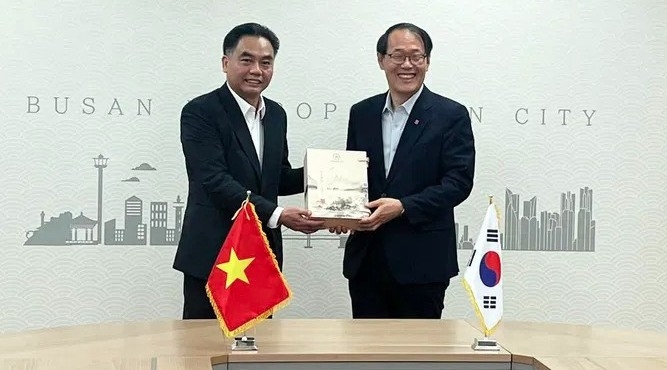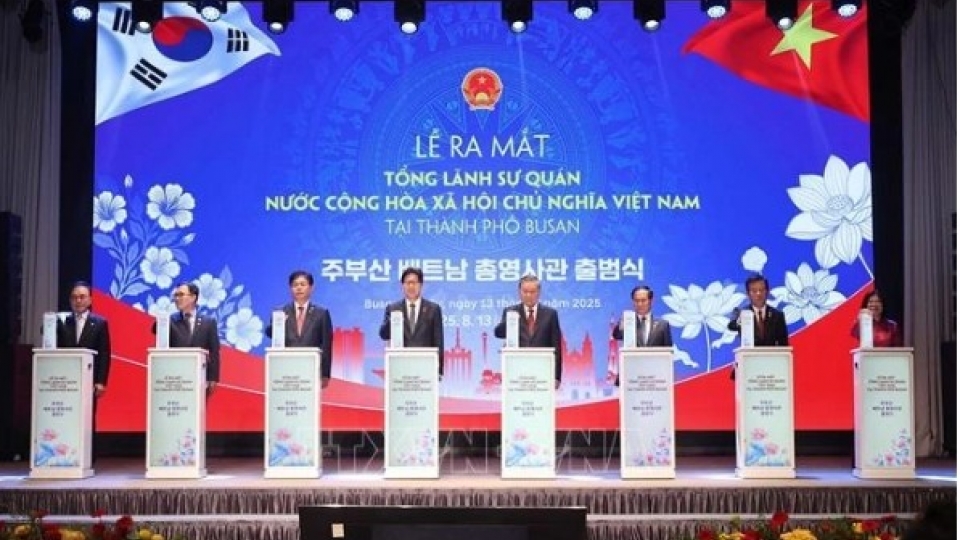HCM City, Busan step up economic ties, deepen strategic partnership
A delegation from Ho Chi Minh City led by Vice Chairman of the municipal People’s Committee Nguyen Loc Ha held talks with Lee Jun-seung, Vice Mayor of Busan, on August 14 to strengthen economic ties and expand their strategic partnership.

Conveying greetings from HCM City’s leadership on the occasion of the Republic of Korea’s (RoK) National Day on August 15, Ha highlighted the increasingly substantive and effective comprehensive strategic partnership between the two nations, which now spans infrastructure, science and technology, and high-quality human resources training.
He noted that HCM City highly valued Busan’s solidarity and timely support, particularly during the challenging COVID-19 period, stressing that was not only material support but also a vivid testament to the close and trusting bond between the two cities.
Presenting the city’s new development vision following its administrative merger on July 1, 2025, Ha said HCM City now covers 6,700 sq.km with three main pillars: the former HCM City as a hub for finance and high technology; the former Binh Duong province as an industrial powerhouse; and the former Ba Ria–Vung Tau province as a centre for marine economy, logistics, and energy industries.
The city aims to position itself as an international centre for economy, finance, services, logistics, high-tech industry, and marine tourism. To realise this goal, it is implementing four strategic central government resolutions, called the “four pillars”, focusing on innovation, artificial intelligence (AI), high technology, and high-quality education, alongside investment in modern, integrated urban and transport infrastructure. Its development strategy also envisions an international financial hub, a multi-purpose industrial centre within the high-tech park, and a leading centre for education.
Ha proposed expanding cooperation with Busan in priority areas, including logistics and seaports, to capitalise on Ba Ria–Vung Tau’s deep-water port advantage and Busan’s role as a Northeast Asian gateway. The two sides should cooperate in green finance and fintech and high technology linked to skilled workforce training, while promoting cultural and educational exchanges to build trust and ensure long-term cooperation.
The RoK is a major investor in HCM City, with more than 2,000 active projects. The southern city is home to around 80,000 Korean nationals and over 2,000 businesses, who have made significant contributions to local socio-economic development. Ha noted that this provides a strong foundation for advancing deeper cooperation, linking public-private resources, and fostering business connections between the two sides.
Vice Mayor Lee Jun-seung noted that about 14,000 Vietnamese citizens, including over 4,000 students, reside in Busan, and pointed to many shared strengths between the two cities, including port operations, artificial intelligence, digital transformation, and logistics. The two sides also enjoy active exchanges in cinematography, education, and training.
He invited HCM City’s leaders to attend Busan’s Global City Week and the General Assembly of the Tourism Promotion Organisation for Global Cities on September 16. He added that Busan businesses are showing strong interest in development projects in the newly expanded HCM City, including the former Dinh Duong province, opening up broader cooperation prospects.
At the conclusion of the talks, both sides agreed to advance concrete cooperative projects with a focus on sustainability, quality, and efficiency, thereby contributing to deeper Vietnam–RoK relations. Ha expressed confidence that building on three decades of cooperation, the two cities could become strategic partners in sustainable development for the benefit of their people and for regional peace and prosperity.




